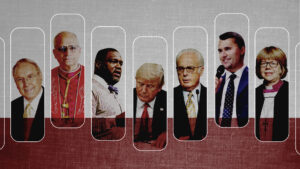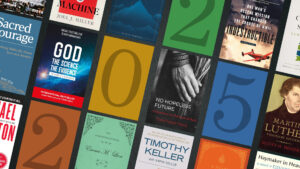This excerpt was adapted from Hannah Anderson’s new book, Made for More: An Invitation to Live in God’s Image (Moody, 2014).
I attended a Christian liberal arts college, and during my junior year, I took one of the most sought-after courses on campus: Philosophy of Education. I was eager for this class because I had grown up in a home that valued learning. My father’s mother, Stella, was the first in her family to graduate from high school by walking three miles from her family farm to the high school in their small mountain community. At 16, my maternal grandmother, Ruth, traveled more than 700 miles from home to become the first in her family to attend college; while there, she met my grandfather, who was also the first in his family to attend college, due in large part to the GI Bill. So it wasn’t too surprising that my parents both ended up as teachers, and I grew up with more books than toys.
Settling in for that first session, I was ready for the professor to inspire me with the beauty and wonder of learning; more than anything I expected him to shore up my own presuppositions. I wasn’t prepared for him to turn them completely on their head. About halfway through that first class, he told us that the goal of all learning is to become fully human—so far, so good—but then he went further. Because education is the process of making us fully human, true education must, by definition, be Christian, because becoming fully human means being conformed to the image of God through Christ.

In a word, education is about finding identity as image bearers.
God of All Knowledge
From the earliest moments of creation, God reveals himself as a God of knowledge. Jeremiah 10:12 proclaims that he “established the world by his wisdom, and by his understanding stretched out the heavens.” But God is not simply the starting place for wisdom; he is Wisdom; he is Truth himself. And this was never clearer than when Jesus was revealed as the Logos of God.
In the first sentence of John’s Gospel, he writes, “In the beginning was the Logos and the Logos was with God and the Logos was God.” Translators have struggled to find just the right English word to translate logos and have settled on word. But this translation has limitations because word doesn’t communicate all that logos means. Logos means both the expression of an idea (the word) and the thought that initiated it. So when John chooses to identify Jesus as the Logos, he is telling us that Jesus is the perfect embodiment of God’s thought. Jesus is God’s wisdom made flesh, dwelling among us.
The beauty of this point becomes breathtakingly clear when we remember what happened in Eden. As image bearers, our first parents were made to find their true selves in God who is perfect truth, but instead, they turned from him to the tree of the knowledge of good and evil. They turned away from true knowledge and were plunged into blind ignorance. Professing themselves to be wise, they became fools.
When John identifies Jesus as the Logos of God, he identifies him as the true knowledge we all have rejected. What the man and woman lost when they grasped for knowledge apart from God—what we each lose every time we turn to something other than him for our sense of self—Jesus restores by becoming the perfect thought, the perfect wisdom, the perfect knowledge of God in human flesh.
From this Logos—from the very mind of God himself—all knowledge flows. Through this Logos—through the very person of God himself—we pursue knowledge in order to image him.
Women and Education
Even today, some question whether or not a woman should pursue education. They reason that women are primarily nurturers and life-givers, falsely believing that this responsibility doesn’t require anything beyond learning a domestic skill set. In response, others argue that certainly women must be educated but precisely because they are the mothers of society. They must be prepared to shape their children, to teach them well, and present them as mature, capable members of the church and society. Then, of course, some reject both of these approaches and stridently argue that women must be educated to free them from the shackles of domesticity. They must be educated in order to take their place on a rung of the corporate ladder.
As different as these approaches appear, they have something in common: all three presume education is primarily about a career. Whether that career is motherhood or being a CFO, they are all based on the assumption that education is primarily about generating a skill set for future work. But what if education—what if learning and thinking and knowing—is less about what you do with your knowledge than it is about the person you become in the process? What if education is first and foremost about becoming image bearers?
We pursue learning because God is a God of knowledge and thought and wisdom, and in order to reflect and represent him, we must become women of knowledge and thought and wisdom. This pursuit can take a variety of forms depending on context and personal giftedness, and it may not necessarily include advanced degrees or groundbreaking theories. But at the very least, becoming women who image him, becoming all we are created to be, means learning to love him, not simply with all of our hearts, but with all of our minds as well.
Ultimately the goal of all learning is to draw us back to humble dependence on the source of knowledge, God himself. True knowledge—knowledge that begins and ends with God—will humble us, because when we finally begin to understand who God is, we will begin to realize how much we don’t understand in the first place. And yet, in his grace, God promises that even though we may only know in part today, there will be a day when we will know him as we have been fully known. And when we know him this way, when we know the love of Christ both mentally and experientially, we will finally be transformed into the image bearers he’s destined us to be.
Download your free Christmas playlist by TGC editor Brett McCracken!
 It’s that time of year, when the world falls in love—with Christmas music! If you’re ready to immerse yourself in the sounds of the season, we’ve got a brand-new playlist for you. The Gospel Coalition’s free 2025 Christmas playlist is full of joyful, festive, and nostalgic songs to help you celebrate the sweetness of this sacred season.
It’s that time of year, when the world falls in love—with Christmas music! If you’re ready to immerse yourself in the sounds of the season, we’ve got a brand-new playlist for you. The Gospel Coalition’s free 2025 Christmas playlist is full of joyful, festive, and nostalgic songs to help you celebrate the sweetness of this sacred season.
The 75 songs on this playlist are all recordings from at least 20 years ago—most of them from further back in the 1950s and 1960s. Each song has been thoughtfully selected by TGC Arts & Culture Editor Brett McCracken to cultivate a fun but meaningful mix of vintage Christmas vibes.
To start listening to this free resource, simply click below to receive your link to the private playlist on Spotify or Apple Music.


































